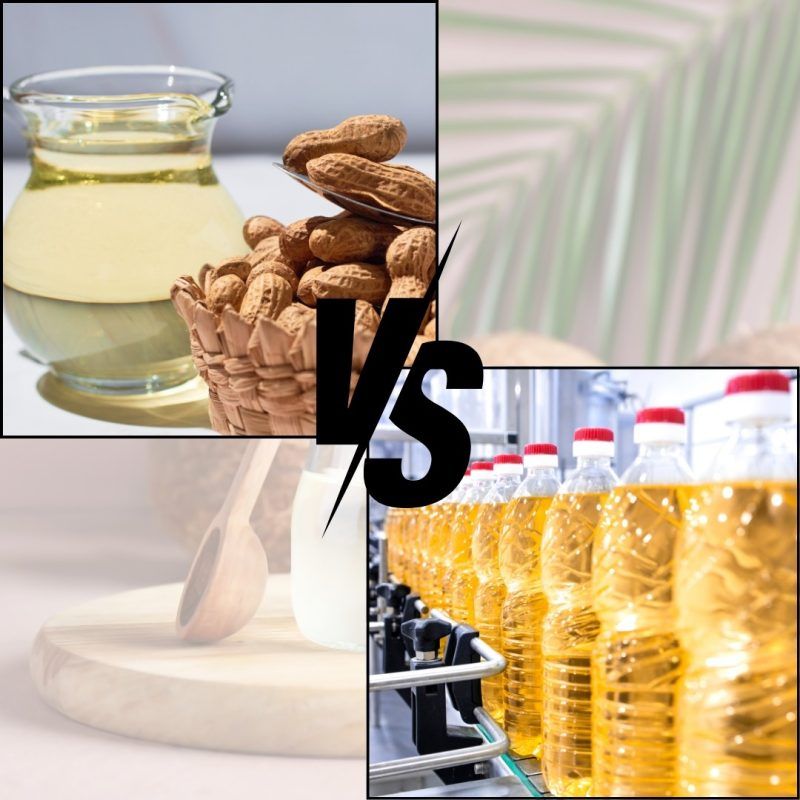Nowadays, everyone is health conscious. They choose healthy options when it comes to food. One important thing people start changing is choosing the oil for cooking. The debate between wood-pressed oils and refined oils has gained more prominence. A deeper understanding of the key differences will help in making healthier choices. Let us dive deep into the major differences between wood-pressed oils and refined oils.
What Are Wood-Pressed Oils?
Wood-pressed oils, also called cold-pressed oils, are extracted by a natural process. They are pressed out of seeds, nuts, or fruits by purely mechanical pressure without the use of heat. This makes the pace of the process slow and maintains the natural property of the oil. The popular variety of wood-pressed oils includes kachi ghani mustard oil, cold pressed groundnut oil, cold pressed sesame oil, among others.
What Are Refined Oils?
Refined oils undergo a series of processes: bleaching, deodorising, and heating. These processes clean the oil of impurities but take away the nutrients in the process. The result is a clear, odourless oil. Most mass-produced refined oils are cheaper. However, they lack the natural goodness of the original source.
Difference in Extraction Process
The underlying difference between these oils is the extraction process. Extraction of wood-pressed oils is done through a wooden press. There is no transmission of heat in this, so the nutrients are retained in the oil. Cold-pressed groundnut oil and kachi ghani mustard oil are varieties of oil that undergo this form of extraction. As the process is slow, the vitamins and antioxidants remain preserved.
Refined oils undergo chemical processes; these include high temperatures and chemicals. The heat would burn off most of the nutrients, and the chemicals would alter some properties of the oil. While refined oils last longer, they will not contain as many healthy properties as their wood-pressed versions.
Nutritional Value
That would mean that wood-pressed oils are rich in essential fatty acids, minerals, and vitamins. For example, cold-pressed sesame oil is rich in antioxidants and good fats. These oils are also free from chemicals and preservatives. In that respect, they are healthier and closer to nature.
This process takes away most of the nutrients from the oil. In the refinement, the high heat required is hot enough to destroy the vitamins and antioxidants within. To offset this deficiency, manufacturers add unnatural vitamins. These do little good and serve no replacement for the natural ones present in wood-pressed oils.
Health Benefits of Wood-Pressed Oils
The list is never-ending with regards to the health benefits of wood-pressed oils. Let us take a look at a few examples:-
- Kachi ghani mustard oil acts as an anti-inflammatory agent. It also improves heart health and boosts immunity.
- Cold-pressed groundnut oil is rich in healthy fats and antioxidants. It helps lower bad cholesterol and hence supports heart health.
- The cold-pressed sesame oil helps maintain good, healthy skin and hair due to its nutritious values. It also helps in digestion and reduces any form of inflammation.
These oils retain their natural flavour and aroma, too. This makes your dishes not only healthier but tastier.
Health Risks of Refined Oils
Refined oils are less healthy because they contain too much trans fat, which increases bad cholesterol. The chemicals used while processing can have adverse health effects. Long-term use of such refined oils may even result in heart diseases, obesity, and inflammation. They lack the natural aroma and flavour because they have lost the natural flavour and aroma in themselves, thereby making food less appealing.
Shelf Life and Storage
Refined oils, because of the addition of preservatives, have longer shelf life and that is why you see these very much available in every store in the supermarkets. But, this extended life occurs at your health’s cost.
Wood-pressed oils have a considerably lesser shelf life. Since they do not contain artificial preservatives or chemicals, it can be consumed more than any other oils provided it is stored in the right way. To keep the wood-pressed oils fresh, store them in a cool and dark place. Some oils such as cold pressed groundnut oil or kachi ghani mustard oil are supposed to be used in a few months for greater efficiency.
Cooking and Smoke Point
It is the temperature at which oil starts breaking down. Wood-pressed oils have a lesser smoke point. Thus, these are best used for low to medium-heat cooking. Cold pressed sesame oil or cold pressed groundnut oil works well in salad dressings and light sautéing.
Refined oils have higher smoke points, hence are more suitable for deep frying. However, even in refined oils, high heat can generate harmful compounds. Choosing wood-pressed oils for everyday cooking ensures that there are fewer harmful compounds in your meals.
Cost Factor
Mass production and longer shelf life make refined oils cheap. However, the cost of health cannot be totally neglected. The wood-pressed oils are costly but offer better nutritional value. Spending a little more on oils like kachi ghani mustard oil leads to payoff in health over the years.
Conclusion
Choosing the correct oil to cook with is a major health decision. Wood-pressed oils, including kachi ghani mustard oil, cold-pressed groundnut oil, and cold-pressed sesame oil, possess a lot of healthy factors in regard to good health. They are rich in nutrients, do not have any sort of chemicals, and also have their natural flavor. On the other side, refined oils extract most of their nutrient value at the time of processing. They may also be more convenient, but they don’t contribute to long-term health.
Switching over to wood-pressed oils can give it that extra kick in your general well-being. Your body will thank you when oils nourish, rather than harm, your health.


